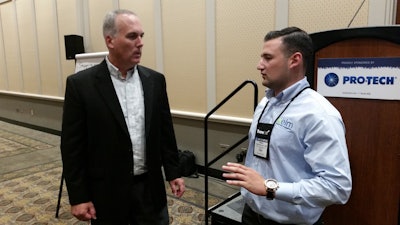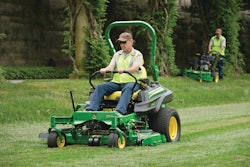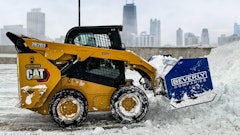
Dan Foley has been in the landscaping and snow removal business for roughly 30 years. He started his company as a sophomore in college, sold it to Brickman in 2009, and proceeded to work there until 2014 when he retired at the age of 47. Foley is now a consultant and speaker.
One of his more recent speaking engagements took place on June 23 at the SIMA Symposium in Providence, RI. Foley reflected on his long career as a snow removal contractor, thinking about the key business lessons learned.
Lesson 1: Slow down to go faster
Foley recalled a time when he'd attended his first NASCAR race. "The owner of one of the popular race teams spoke to us," Foley told. "He explained how a driver has to slow down when going around corners in order to race faster overall. It makes sense, and it applies to business as well."
Foley said company owners can grow addicted to urgency. There are consequences to that. When you're constantly running at full throttle, you can miss opportunities to grow and/or simply improve what you're already doing.
"Like a NASCAR driver, you have to identify where the corners in your business life are," Foley said. "You must be able to control different types of situations. Think about what those situations and occurrences are—and develop countermeasures."
Foley liked to develop different "war game" scenarios. As an example, he'd asked his SIMA audience to discuss what would have to happen in their companies if the following situation presented itself.
It is mid-fall and you're scrambling to complete your remaining landscape projects. Local news outlets are reporting the possibility of an early winter storm in about a week. This grabs your attention—but since the storm is not a certainty, you maintain focus on the landscaping work. A couple of days later, meteorologists are now ramping up their forecast with a high degree of certainty.
Foley's audience came up with the following:
- Halt landscaping production and inform clients
- Review snow contracts that are in, call clients and offer assurance
- Identify contracts still outstanding and follow up
- Switch over equipment and pray everything works
- Is your salt supply ready to go?
- Review routing
- Call subcontractors
- Check employee preparedness and morale
What is interesting is that this unexpected situation had very expected reactions. "When you get down to it, this really is a predictable business," Foley said. You just have to slow down and plan.
Lesson 2: Open-book management
Foley said many contractors flinch when they hear this. That's because open-book management is often mischaracterized. It's not about opening up your checkbook so every employee can see every salary and expenditure.
"You want to teach employees the rules of the game and your goals, keep score and post results, and provide a clear line of sight and stake in the outcome," Foley explained. In other words, tell employees what they can do to help the company succeed, identify ways to measure their performance, share those measurements on a regular basis, and then reward them when goals are met.
"A lot of companies provide an end-of-year bonus," Foley said. While the intentions are good, this often misses the mark. "Many employees don't really understand why they are getting the bonus. They just come to expect it at year's end. As a result, the impact isn't very lasting." Providing bonuses that are directly tied to team performance measures on a more frequent basis, perhaps quarterly or even monthly, can be a more effective way to go.
Lesson 3: Laboring over labor
Employee management is one area where most contractors are in reactive mode. Foley said you need to outline a strategy for bringing talent into your company. It starts with identifying the type of people you want to work for you, i.e. their skillsets and personality traits. It carries through to the process you have for on-boarding new employees.
Lesson 4: Get keen on lean
Foley began studying lean management later in his contracting career. Doing so taught him to rethink quality as it relates to the services his company provides, which in turn had a profound impact on the efficiency of his company.
"Quality is what the buyer gets out of a product or service, not what the supplier puts in," Foley said. Think about it this way: If something were a line item on an invoice, would a customer be willing to pay for it? If not, you have to look at it as waste. While you may not be able to eliminate it completely, you should do everything in your power to minimize the time and money you spend on it.
What kind of "waste" happens in snow removal? Everything from payroll processing to mobilizing crews to maintaining equipment. These are actions and costs that must take place in order to deliver the services your clients do want to pay for, which is plowing and removing snow, treating surfaces and good communication. Even when it comes to communication, Foley said there can be a lot of waste involved. Don't force feed information down your clients' throats. Ask them what they want to know, when, and in what format.
Lesson 5: Clear communication
On that note, Foley said contractors should work hard to always be clear in their communications. With respect to clients:
- Have a plan and tell them what you are going to do
- Do it
- Tell them you did it, which could be something as simple as a text message
"Most contractors excel at one or two of those steps, but not too many excel at all three," Foley said. "If you want to really be successful in snow removal, you must do all three proactively."
In terms of internal communication with your employees, Foley lived by an important rule. "If you ever find yourself talking about any of your employees, it is time to talk to them," Foley said.
Lesson 6: Dampen the drama
When you're dealing with people, there will always be a bit of drama. As the owner, you can set the tone and not perpetuate it.
"Are you above or below 'the line'?" Foley asked. When you're below the line, you view situations as a victim. You're paranoid. You're stressed. It shows. When you're above the line, you're still stressed, but you're focused on solutions and remaining positive. You face challenges head on. You lead.
"Staying above the line can have a tremendous impact on culture," Foley pointed out. "You just have to manage all of those little stories in your head." In other words, when something goes wrong, don't start immediately pointing blame and thinking about why a certain employee did or didn't do something. And certainly do not speculate as to their motives. Talk to them and fix the problem.
Lesson 7: Exude optimism
Staying positive and "above the line" can be tough in a business as stressful as snow removal. But you have to make every effort to stay there. Foley said you should start by changing all of your "I have to do's" into "I get to do's." That simple mindset shift is an important first step.
Next, never take anything for granted—your relationships, your vendors, and certainly your employees. "Practice 'active appreciation,'" Foley said. "Ask your employees to list their accomplishments. Thank them and recognize those accomplishments."
Lesson 8: Leverage bright spots
On that note, it's important to take time to recognize those bright spots in your business. "As owners, we tend to focus on fixing things, which keeps our attention on what is wrong in our business," Foley said. "But you have to take time to acknowledge what is working and going well."



![Doosan Bobcat Wacker Neuson Stack 2ec Js Pb V6e[1]](https://img.greenindustrypros.com/mindful/acbm/workspaces/default/uploads/2025/12/doosan-bobcat-wacker-neuson-stack2ecjspbv6e1.CPyyz8ubHn.png?auto=format%2Ccompress&bg=fff&fill-color=fff&fit=fill&h=100&q=70&w=100)







![Doosan Bobcat Wacker Neuson Stack 2ec Js Pb V6e[1]](https://img.greenindustrypros.com/mindful/acbm/workspaces/default/uploads/2025/12/doosan-bobcat-wacker-neuson-stack2ecjspbv6e1.CPyyz8ubHn.png?ar=16%3A9&auto=format%2Ccompress&bg=fff&fill-color=fff&fit=fill&h=135&q=70&w=240)

![Gravely Pro Turn Mach One My23 Dsc03139 Edit 1200x800 5b2df79[1]](https://img.greenindustrypros.com/mindful/acbm/workspaces/default/uploads/2025/10/gravely-pro-turn-mach-one-my23-dsc03139-edit-1200x800-5b2df791.BucBnDoN22.jpg?ar=16%3A9&auto=format%2Ccompress&fit=crop&h=135&q=70&w=240)


![Kubota Snow ah3 Sgv25ua[1]](https://img.greenindustrypros.com/mindful/acbm/workspaces/default/uploads/2025/10/kubota-snowah3sgv25ua1.bAUoUSziui.png?ar=16%3A9&auto=format%2Ccompress&bg=fff&fill-color=fff&fit=fill&h=135&q=70&w=240)



